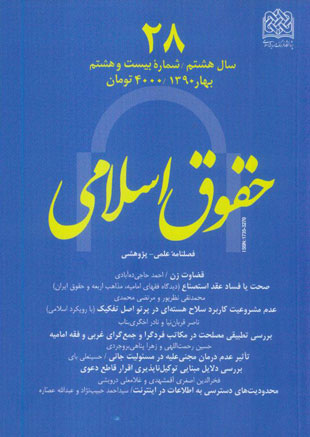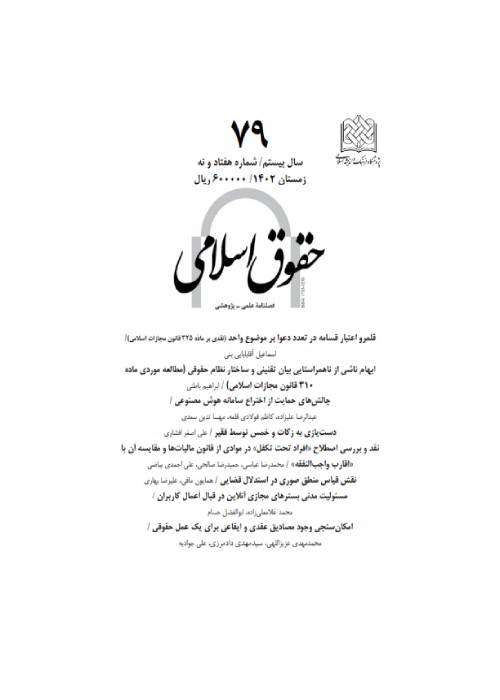فهرست مطالب

فصلنامه حقوق اسلامی
سال هشتم شماره 1 (پیاپی 28، بهار 1390)
- 240 صفحه، بهای روی جلد: 40,000ريال
- تاریخ انتشار: 1390/02/15
- تعداد عناوین: 7
-
-
صفحه 7
-
صحت یا فساد عقد استصناع / دیدگاه فقه ای امامیه، مذاهب اربعه و حقوق ایرانصفحه 37
-
Page 7One of the challenging issues in Female rights concerns female judgment. What that is controversial concerning female judgment is that on the one hand judgment is of a custody nature and, on the other hand, nobody is, in principle, custodian of another unless in cases that there is (are) firm reason(s). Concerning female, it is controversial that whether or not there are such reasons. The present writing divides reasons according to them female cannot judge into two groups: the reasons of the first group show that there is no need [to female judgment], and the reasons of the other group show that there are some hindrances. Finally, based on a study of the scope of female judgment, it has been discussed that whether or not a female may be a judge or have juridical jobs other than arbitration or delegation.Keywords: judgment, arbitrator, delegacy in judgment, taste of sharia, the principle of prohibition of custody
-
Page 37Contract of istisna' or order of manufacture is one of the contracts which, nowadays, because of numerous uses made of it in many societies, is very popular to fulfill personal and social needs. Today, many companies, institutes, and firms demand items which are not only absent in the market but also they should be tailored and manufactured from the beginning to the end according to the demanded features. In such cases, if the manufacturer does not receive and order of manufacture, it will not accept to do so. In the Article 98 of the Fifth Plan of Development of the Islamic Republic of Iran, the contract of istisna' was added to the contracts included in the Chapter Three of the usury free banking act. Thus, study of foundations of legitimacy of this contract is of paramount importance. In the present study, we are seeking to find replies for these questions: is the contract legitimate according to the earlier Imami jurists as well as earlier jurists of the four Sunni schools? Is there a theoretical agreement in this regard? What is the place of the contract of istisna' in Iranian Law? Results suggest that the contract of istisna' is legitimate; and arguments posed for its illegitimacy by Shaykh Tusi (reh) are disputable. Though arguments posed by Hanafi jurists for legitimacy of the contract of istisna' cannot be accepted, juridical principles and rules show that this contract is legitimate.Keywords: contract of istisna', treaty, juridical legitimacy, views of earlier Imami jurists, views of the four Sunni schools, Iranian Law
-
Page 73Together with man's striking advances in the field of new technologies, influenced by such advances, weapons have become more destructive and more horrible and created a terrible situation for humanity. The most important ones among such weapons are nuclear weapons whose main characteristic is mass destruction without any difference between civil and military individuals on the one hand and civil and military goals on the other. The scope of mass destruction by nuclear weapons is so extensive that it cannot be confined to a determined and limited area; and it is almost impossible to control mass destruction by such weapons. One of the established, fundamental, and humanitarian principles which is based on the Islamic and international standards is, however, necessity of observance of the "principle of separation" when a weapon is used and a military attack is made. In the present article, based on the principle of separation and its place in the international and Islamic laws, we have tried to show [consequences of] violation of this principle when, in a military conflict, nuclear weapons are used by one of the enemies, and, therefore, to prove, in spite of the decree issued by International Court of Justice, that making uses of and even threat to make uses of nuclear weapons are illegitimate.Keywords: nuclear weapon, humanitarian laws, principle of separation, civil, military individuals, goals
-
Page 105The western schools have tried to explain "interest" based on human reason. Individualists who have put emphasis on individual interest have not adopted a fixed and stable approach to interest and the way that it should be provided. They are regularly in fluctuation between merely focusing on individual interest and paying relative attention to collective interest. There is disagreement among collectivists who attach importance to the public interest to justify the ways that it should be realized. In such approaches, interest is generally taken as material interest; and, since such approaches are consequentialist and without a priori norms and do not take into consideration the permanently changeable conditions, they are not stable as much as it is necessary, and have no fixed definition for interest and the way that it should be provided. Imami jurisprudence, however, enjoys stable standards to define and recognize interest and the ways that it is realized in the society. And though both public and individual interests are of importance, if there is some conflict, the public interest will be preferred.Keywords: public interest, individual interest, individualism, collectivism, State
-
Page 139In many crimes, the victim is in such a state that if he is treated, he will be cured, and if he is not treated, he will die. In such cases, an important question arises: is the victim's act or act of omission of some impact on the criminal's responsibility? Jurists approach this question from various viewpoints. Though some jurists are of the opinion that omission of treatment by the victim is of no impact on the criminal's responsibility, according to the accepted view if the victim survives when treated, but avoids intentionally to do so, her/his life is of no value, and the criminal has no responsibility except for the original crime; and if the victim omits to treat unintentionally, the criminal should, as required, pay blood-money or be retaliated. Also, if the victim wills to treat herself/himself but the physician avoids to do so and as a result the victim dies (and if the victim is treated, she/he will survive), a question will arise: "is the physician's avoidance of some effect on the criminal's responsibility?"Keywords: omission of treatment, blood, money liability, avoidance of treatment, physician's responsibility, spread of crime, act of omission
-
Page 169Though it is well-known in jurisprudence that a confession may be delegated, it has been stated in the Article 205 of the civil procedure of public and revolutionary courts (approved in 2000) that a confession which may terminate a lawsuit cannot be delegated. It may be asked, therefore, that "what are the fundamental reasons for doing so by the legislator?" Reasons which may be enumerated to justify the Article 205 are as follows: the one who confesses should be the main one, confession should not harm others, interests of the client should be protected, consensus of jurists, confession should only concern compositional affairs, the principle of acquittance should be observed. In the present article, the above reasons have been discussed and it is shown that they cannot justify the Article 205. It is proposed, therefore, that the above-mentioned Article should be corrected.Keywords: a confession which may terminate a lawsuit_agency_case arrangements_agency in delegacy
-
Page 191The age of explosion of information and electronic advances has developed the instances of the right to access to information as one of the consequences of the right of free speech. Freedom of speech requires [the right of] active search of information in the sources; and those who enjoy freedom of speech should enjoy the right of access to information as well. Freedom of information, therefore, should be taken as a perquisite to secure freedom of speech. The extensive scope of internet has strikingly extended the scope of freedom of speech and information, and has provided an unlimited space to disseminate information and news. One of the concerns which has been produced as this phenomenon has been extended to cover all the world is the fact that it cannot be supervised, and its contents are somehow uncontrollable. For, each and every one is able to launch some points in his webpage, and this webpage may find many readers. Some western thinkers who attach importance to liberalist theories are of the opinion that filtering is in conflict with the right of free speech. Some others, of course, advocate the opposite view. Various issues such as protection of public morals, national security, privacy and the like have convinced States to pay serious attention to refinement of the contents of the Web.Keywords: freedom of speech, right to access to information, filtering, privacy


